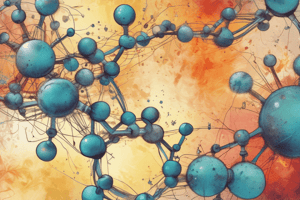Podcast
Questions and Answers
What is the purpose of adding coefficients to an equation when balancing it?
What is the purpose of adding coefficients to an equation when balancing it?
- To change the products of the equation
- To add more reactants to the equation
- To balance the number of atoms of each element (correct)
- To change the subscripts of reactants
A combustion reaction is a type of replacement reaction.
A combustion reaction is a type of replacement reaction.
False (B)
What is the definition of oxidation?
What is the definition of oxidation?
The loss of one or more electrons by an atom, molecule, or ion
A _______________ reaction is a reaction that involves both oxidation and reduction.
A _______________ reaction is a reaction that involves both oxidation and reduction.
Match the following types of reactions with their formulas:
Match the following types of reactions with their formulas:
Flashcards are hidden until you start studying
Study Notes
Balancing Equations
- A balanced equation has the same number of atoms of each element on both the reactant and product sides.
- To balance an equation, coefficients (numbers in front of formulas of reactants or products) are added to the equation, not subscripts (numbers within formulas).
- Steps to balance an equation:
- Write the unbalanced equation with the reactants on the left and products on the right.
- Count the atoms of each element on both sides of the equation.
- Add coefficients to balance the equation, starting with the elements that appear in the greatest number of formulas.
- Check the equation to ensure it is balanced.
Types Of Reactions
- Synthesis Reactions: Two or more reactants combine to form a single product.
- Formula: A + B → AB
- Decomposition Reactions: A single reactant breaks down into two or more products.
- Formula: AB → A + B
- Replacement Reactions: One element replaces another element in a compound.
- Formula: A + BC → AC + B
- Combustion Reactions: A substance reacts with oxygen to produce heat and light.
- Formula: 2CH₄ + 3O₂ → 2CO₂ + 3H₂O
Oxidation and Reduction
- Oxidation: The loss of one or more electrons by an atom, molecule, or ion.
- Reduction: The gain of one or more electrons by an atom, molecule, or ion.
- Oxidizing Agent: A species that causes oxidation, often by accepting electrons.
- Reducing Agent: A species that causes reduction, often by donating electrons.
Redox Reactions
- A redox reaction is a reaction that involves both oxidation and reduction.
- Oxidation Number: A number assigned to an atom in a molecule to indicate its oxidation state.
- Redox Reaction Types:
- Combustion Reaction: A reaction that involves the oxidation of a substance by oxygen.
- Disproportionation Reaction: A reaction in which a single reactant is both oxidized and reduced.
- Single Displacement Reaction: A reaction in which an element displaces another element from a compound.
Balancing Equations
- A balanced equation has the same number of atoms of each element on both the reactant and product sides.
- Coefficients (numbers in front of formulas) are added to balance an equation, not subscripts (numbers within formulas).
- Steps to balance an equation: write the unbalanced equation, count atoms of each element on both sides, add coefficients to balance, and check the equation.
Types Of Reactions
Synthesis Reactions
- Definition: Two or more reactants combine to form a single product.
- Formula: A + B → AB.
Decomposition Reactions
- Definition: A single reactant breaks down into two or more products.
- Formula: AB → A + B.
Replacement Reactions
- Definition: One element replaces another element in a compound.
- Formula: A + BC → AC + B.
Combustion Reactions
- Definition: A substance reacts with oxygen to produce heat and light.
- Formula: 2CH₄ + 3O₂ → 2CO₂ + 3H₂O.
Oxidation and Reduction
Oxidation
- Definition: The loss of one or more electrons by an atom, molecule, or ion.
Reduction
- Definition: The gain of one or more electrons by an atom, molecule, or ion.
Oxidizing Agent
- Definition: A species that causes oxidation, often by accepting electrons.
Reducing Agent
- Definition: A species that causes reduction, often by donating electrons.
Redox Reactions
- Definition: A reaction that involves both oxidation and reduction.
Oxidation Number
- Definition: A number assigned to an atom in a molecule to indicate its oxidation state.
Redox Reaction Types
Combustion Reaction
- Definition: A reaction that involves the oxidation of a substance by oxygen.
Disproportionation Reaction
- Definition: A reaction in which a single reactant is both oxidized and reduced.
Single Displacement Reaction
- Definition: A reaction in which an element displaces another element from a compound.
Studying That Suits You
Use AI to generate personalized quizzes and flashcards to suit your learning preferences.




